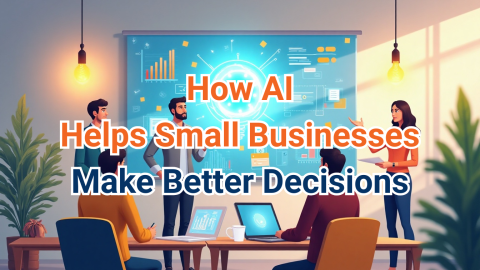You’ve probably heard that AI is transforming the way businesses work—but if you’re running a small company, it can be hard to know where to begin. You might not have a tech team or the budget for custom software, but that doesn’t mean AI isn’t for you.
In fact, some of the most effective AI strategies for small businesses are low-cost, easy to implement, and can have a huge impact on productivity, marketing, and customer service.
In this article, we’ll walk you through five AI strategies that you can start applying in your business right away—even if you’re not a tech expert.
1. Start With a Single Automation Goal
The fastest way to see value from AI is to choose one repetitive task and automate it. It could be:
- Scheduling meetings
- Sending invoice reminders
- Posting to social media
- Organizing incoming emails
Use tools like Zapier, Make, or ChatGPT-powered automations to handle these small but time-consuming activities.
Why it works:
You get immediate time savings with very little setup. It’s a confidence boost that shows AI’s value quickly.
2. Use AI to Improve Your Content Marketing
If your business relies on a digital presence (and most do), you likely spend a lot of time creating content—emails, social media posts, blog articles, etc.
AI writing assistants like ChatGPT, Jasper, or Copy.ai can help you:
- Generate ideas
- Write first drafts
- Repurpose content across platforms
- Stay consistent with your tone of voice
Why it works:
Marketing gets done faster without sacrificing quality. You save hours every week while keeping your audience engaged.
3. Add AI-Powered Customer Support
You don’t need a big call center to offer great support. AI chatbots and helpdesk tools like Tidio, Freshdesk, or Zendesk AI can:
- Answer frequently asked questions
- Handle live chat 24/7
- Route complex issues to a human
- Save chat transcripts and auto-summarize them
Why it works:
You deliver better customer service while reducing the time you or your team spend answering repetitive questions.
4. Use AI to Make Better Decisions
You likely already collect customer or sales data—but AI tools help you actually use it.
- CRM platforms like HubSpot and Zoho CRM use AI to identify leads that are most likely to convert
- Inventory systems can suggest when to restock based on past patterns
- Email platforms like Mailchimp can tell you which subject lines are likely to perform best
Why it works:
You make informed decisions instead of guessing—and that means better results and less waste.
5. Train Your Team to Use One AI Tool
Don’t keep AI locked to the owner or manager. Empower your team by:
- Showing them how to use a tool like ChatGPT, Grammarly, or Notion AI
- Encouraging them to use it for routine tasks or content drafts
- Letting them suggest ways AI could improve their work
Why it works:
You create a culture of innovation where everyone is looking for ways to be more efficient and creative.
What Makes These Strategies “Simple”?
Each of these strategies meets three criteria:
- Low barrier to entry – No coding or complex software needed
- Quick return – You’ll start seeing value within days or weeks
- Scalable – You can build on them over time as your confidence grows
Even just one small step with AI can lead to bigger changes in how you run your business.
Conclusion
You don’t need a massive budget or a tech team to start using AI effectively. These five AI strategies for small businesses are designed to be practical, affordable, and easy to implement—even if you’re just starting out.
Begin with one strategy that solves a real problem in your business. Once you see the results, it’ll be easier (and exciting) to explore what else AI can do for you.
Still feeling overwhelmed? Then the 60 Minute AI Consulting Session is perfect for you!





